Are you aware of the Barnum effect? It’s a psychological phenomenon that explains why we often believe vague and generalized statements about ourselves, even when they could apply to anyone. Let’s explore what is the Barnum effect, how it works, and how to overcome it.
What is the Barnum effect?
The Barnum effect, also known as the Forer effect in psychology, is named after P.T. Barnum, the famous American showman and circus owner.
It refers to the tendency of people to accept generalized and vague descriptions of their personalities as accurate, even when those descriptions could apply to a wide range of people.
Barnum effect examples: Barnum statements like “I have a great sense of humor, but I can be serious when needed” or “I tend to worry about what others think of me” are typical statements that might be used in a Barnum effect test.
These Barnum statements are broad enough that they could apply to almost anyone, yet people tend to believe them because they feel personally meaningful.
Related: 25 Fascinating Psychological Effects Most of Us Don’t Know About
Looking for more Barnum effect examples? Read on.
Barnum effect examples
Let’s explore the Barnum effect in personality assessment. Imagine you come across an online personality test or quiz titled “Discover Your True Personality Type!” Intrigued, you decide to give it a try. As you answer a series of questions, the quiz calculates your results and presents you with a personalized description.
It reads, “You are an outgoing and adventurous individual who loves trying new things. You have a strong sense of empathy and easily connect with others on an emotional level. People are naturally drawn to your magnetic personality.“
Reading these Barnum statements, you can’t help but feel amazed at how accurately the quiz seems to capture your essence. You find yourself nodding and thinking, “Wow, this is so accurate! How did they know?”
Little do you know that the description you received is actually a cleverly crafted statement designed to evoke the Barnum Effect. It’s a general description that could apply to a wide range of individuals, yet it feels remarkably personalized and spot-on to you in that moment.
In this way, the Barnum effect can lead to inaccurate self-perception and misguided decisions, which can have negative consequences in various areas of life. This is one of the most common barnum effect examples. The Barnum effect in horoscope can also be observed similarly.
It’s important to approach generalized statements about personality and abilities with a critical eye and to seek out feedback and experiences that can provide a more accurate and nuanced understanding of ourselves.

How does the Barnum effect work?
Understanding what is the Barnum effect is the first step to knowing how it works. The Barnum effect relies on a combination of factors that make generalized statements about personality seem accurate and personalized.
One key factor is the human tendency to seek out information that confirms our existing beliefs and biases.
When we hear Barnum statements that seems to describe us, we’re more likely to remember it and believe it because it aligns with our self-perception.
Another factor that contributes to the Barnum effect is the power of suggestion. When someone tells us something about ourselves, it can be difficult to resist the suggestion, even if it’s vague or general.
For example, if a psychic tells us that we have a “restless spirit,” we might start to feel like we do, even if we didn’t think of ourselves that way before.
Why does the Barnum effect matter?
The Barnum effect or the Forer effect in psychology can have both positive and negative effects on our lives.
While it can be reassuring to hear positive things about ourselves, especially if we’re feeling down or insecure, it can also lead us to make decisions based on inaccurate or incomplete information, which can have negative consequences.
For example, if we believe that we’re naturally talented at a particular skill or activity, we might not put in the necessary effort to improve our abilities. Conversely, if we believe that we’re “not cut out” for something, we might give up too easily and miss out on opportunities for growth and development.
Why does the Barnum effect occur?
Once you know what is the Barnum effect, you will realize that there are a few reasons why we may become susceptible to this psychological phenomenon –
1. We seek patterns
Our minds are wired to find patterns, even where none actually exist. We impose order on ambiguity.
Related: 23 Amazing Psychology Facts Everyone Needs To Know
2. We crave self-validation
We want to believe positive things about ourselves, so vague positive statements feel affirming. This is particularly true for the Barnum effect in horoscope or astrology..
3. We have confirmation bias
We filter ambiguous information through our preexisting self-views and notice confirmations more than discrepancies.
4. We lack objective standards
We have no external standards to determine if the information is truly accurate and specific to us.
5. We value uniqueness
We want to believe we are special and unique, so we embrace personalized descriptions even when they’re vague.
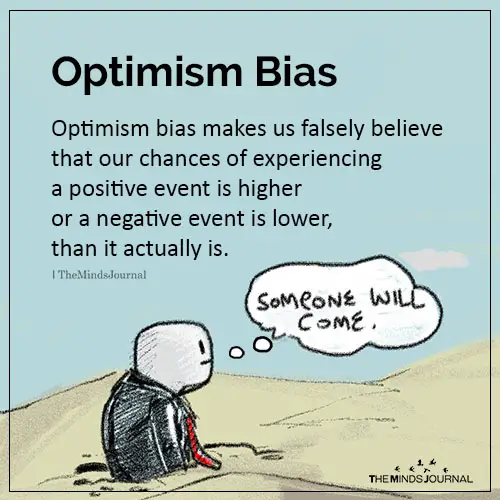
Applications of the Barnum effect in daily life
It is crucial to know what is the Barnum effect as this psychological phenomenon has many applications in our day-to-day lives, including in areas such as personal relationships, career development, and decision-making.
Here are some examples of how the Barnum effect works in these areas and how to overcome it:
1. Personal relationships
The Barnum effect or Forer effect in psychology can influence our perceptions of other people and our relationships with them. For example, we might believe that a new romantic partner is “perfect for us” based on a few generalized characteristics, even if we don’t know them well.
To overcome this, it’s important to take the time to get to know the person and evaluate them based on specific qualities and behaviors, rather than generalized statements.
2. Career development
This psychological phenomenon can also affect our career development by leading us to believe that we’re naturally talented or suited to certain careers, even if we don’t have the skills or experience to back it up.
To overcome this, seek out specific feedback on your skills and abilities, and consider exploring careers and opportunities that challenge you to develop new skills.
3. Decision-making
The Barnum effect can impact our decision-making by leading us to make choices based on inaccurate or incomplete information.
For example, we might choose a product or service based on vague marketing claims, rather than researching its specific features and benefits. This is especially true for the Barnum effect in personality assessment as it influences how we see ourselves.
To overcome the Barnum effect in decision-making, take the time to gather specific information and evidence before making choices, and be skeptical of generalized statements and claims.
Related: How Heuristics And Biases Influence Decision-Making
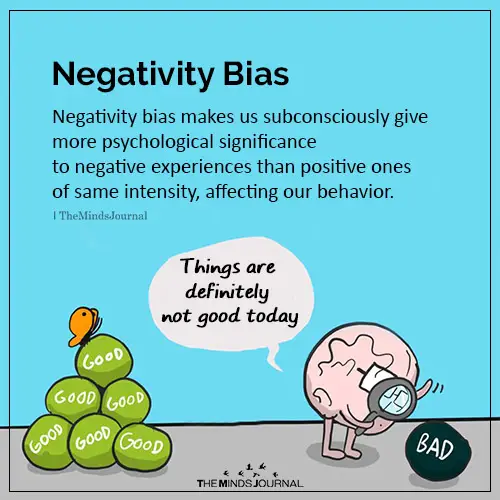
How to avoid the Barnum effect in our daily lives
Avoiding the Barnum effect in our daily lives requires a combination of self-awareness, critical thinking, and healthy skepticism. Here are some specific strategies that can help:
1. Be aware of the Barnum effect
Knowing what is the Barnum effect is the first essential step to avoiding it. Simply being aware of the phenomenon can help you recognize when it’s at play in your life.
When you encounter vague or general statements about yourself, be mindful of the possibility that they might apply to a wide range of people. Do not automatically assume that they’re accurate.
2. Seek out specific feedback
Instead of relying on generalized statements about your abilities or personality, seek out specific feedback from people who know you well.
Ask for specific examples of your strengths and weaknesses, and use that feedback to develop a more accurate and nuanced understanding of yourself.
3. Be skeptical of marketing claims
Advertisers often use generalized language to appeal to a wide audience, but that doesn’t mean that their claims are accurate. When evaluating marketing claims or product descriptions, look for specific details and evidence to support the claims.
4. Consider alternative explanations
When you encounter feedback or information that seems to confirm your beliefs or biases, consider alternative explanations that might be more accurate.
For example, if you receive feedback that you’re a “natural leader,” consider whether your success in leadership roles might be due to specific skills or experiences, rather than an innate ability.
5. Develop a growth mindset
By adopting a growth mindset, you can focus on developing your skills and abilities, rather than relying on generalized statements about your talents. Embrace challenges and opportunities for growth, and recognize that your abilities can be developed through hard work and practice.
Related: What Is The Dunning-Kruger Effect (And How To Avoid This Cognitive Bias)
Here are some other ways we can avoid falling prey to this psychological effect, especially for Barnum effect in horoscope or the Barnum effect in personality assessment –
6. Be skeptical of vagueness
Remind yourself that vague statements can apply to many people, not just you. Question whether the descriptions are truly specific and personalized.
7. Look for details and specificity
Check if the statements contain concrete details, examples and specifics that show true insight into your personality. Avoid generalizations.
8. Check for confirmation bias
Examine if you are selectively noticing details that confirm your self-view while ignoring things that don’t fit. Try to be even-handed.
9. Get outside perspectives
Ask others if the personality description truly matches your personality. Their more objective view can help counteract your own subjective perspective.
10. Remain skeptical of “uniqueness“
Resist the urge to believe you are special or one-of-a-kind based on a vague analysis. There’s likely some truth to the description, but also some exaggeration.
11. Practice critical thinking
Train yourself to question claims, look for evidence and avoid jumping to conclusions based on limited information. This will make you less susceptible overall.
The Barnum effect or Forer effect in psychology can be countered by understanding what is the Barnum effect, cultivating a healthy skepticism and developing a more nuanced understanding of ourselves and the world around us. It requires a willingness to challenge our assumptions.
Seek out specific feedback and evidence, challenge your assumptions and biases, and focus on developing your skills and abilities through hard work and practice.
The key is to adopt a more objective, critical mindset. With a healthy dose of skepticism and critical thinking, we can avoid falling for the Barnum effect trap. By doing so, you can avoid the pitfalls of the Barnum effect and make more informed decisions in your daily life.
Related: 35+ Mind-Bending Psychology Facts About Human Behavior
Be aware of the Barnum Effect
The Barnum effect serves as a reminder of our innate desire for validation and our tendency to accept generalizations as personalized descriptions. From Barnum effect in horoscope
to the Barnum effect in personality assessment, we encounter this psychological phenomenon in various aspects of our lives. By understanding the Barnum Effect and applying critical thinking, we can protect ourselves from its subtle influence.
Remember that you are a complex individual with unique strengths, weaknesses, and experiences. Instead of relying solely on external sources, take the time to reflect on your own qualities, values, and goals. Engage in self-reflection and seek feedback from trusted individuals who truly know you.
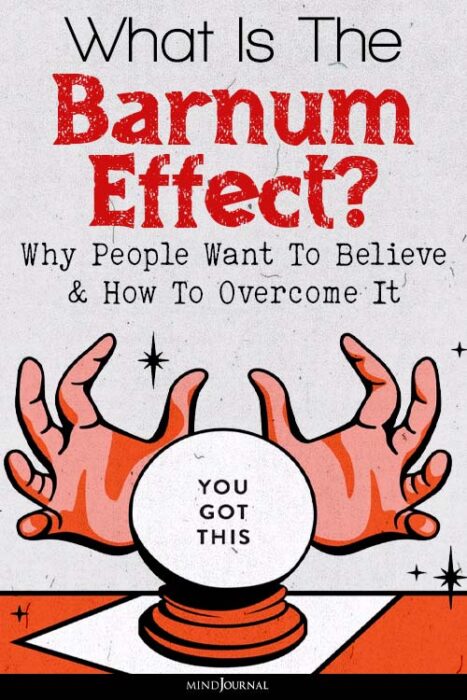
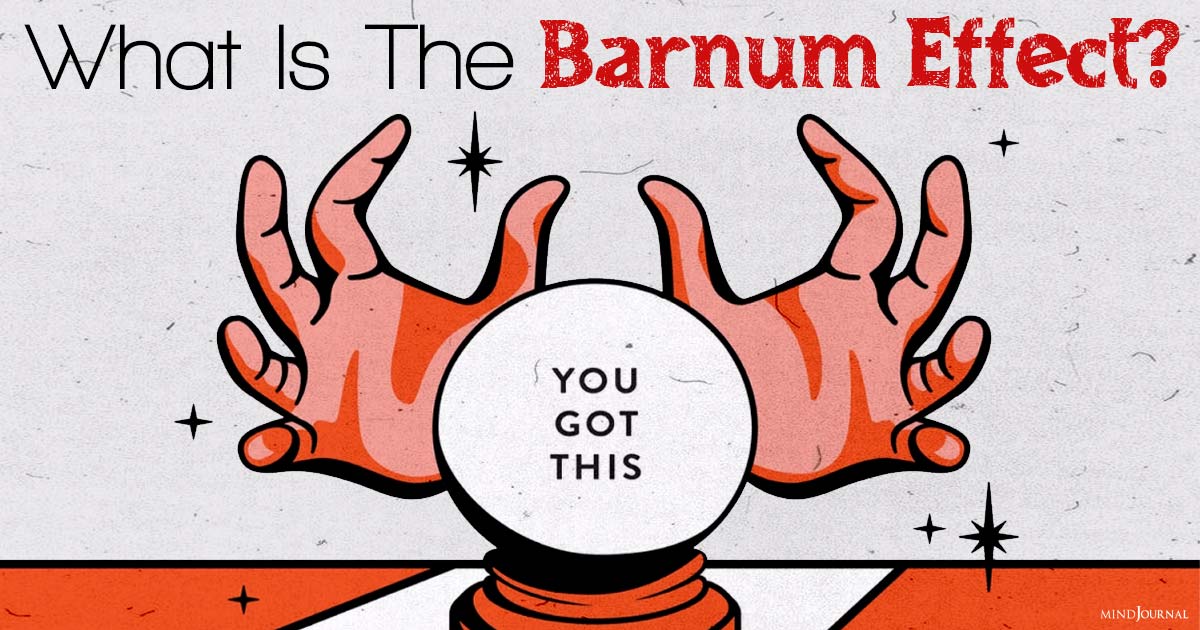



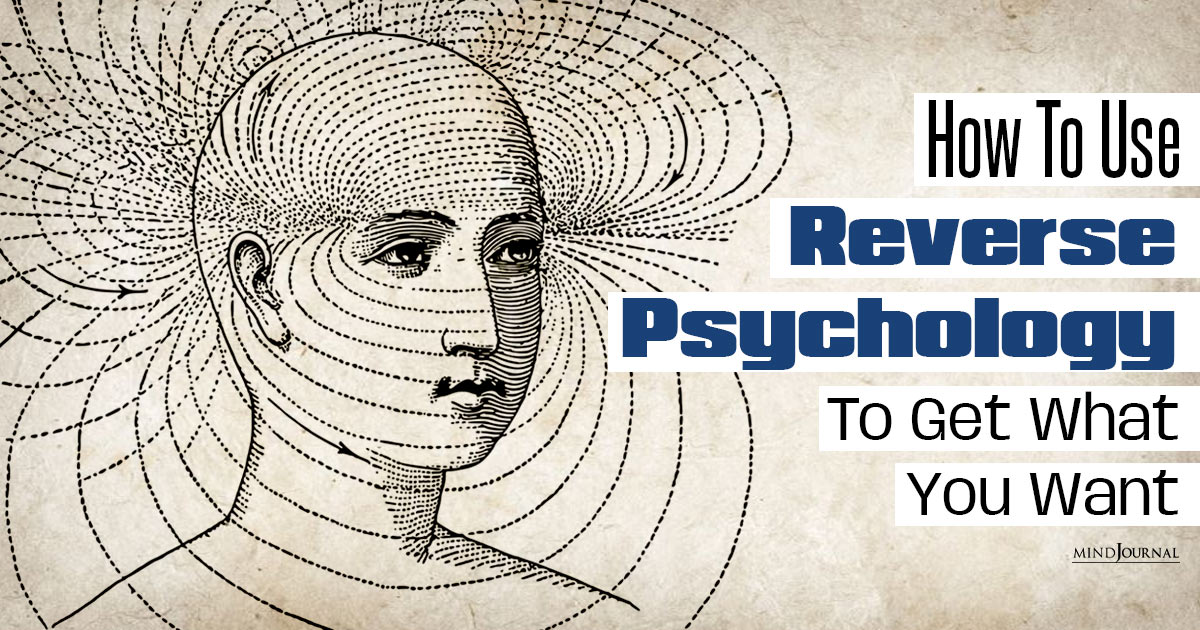



Leave a Reply
You must be logged in to post a comment.